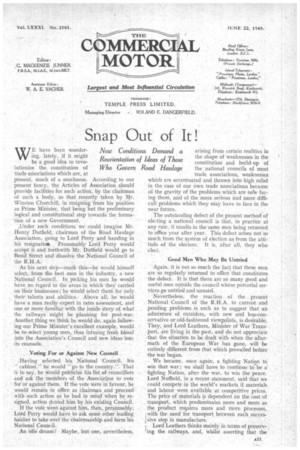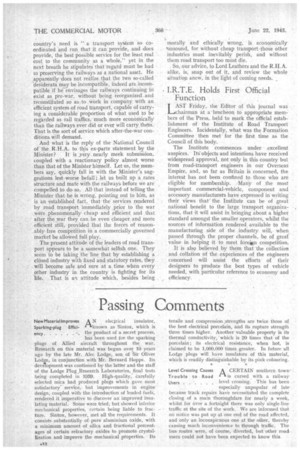Snap Out of It!
Page 13

Page 14

If you've noticed an error in this article please click here to report it so we can fix it.
New Conditions Demand a Reorientation of Ideas of Those Who Govern Road Haulage
WE have been wondering, lately, if it might be a good idea to revolutionize the constitution of trade associations Which are, at present, much of a muchness. According to our present fancy, the Articles of Association should provide facilities for such action, by the chairman of such a body, as that recently taken by Mr. Winston Churchill, in resigning from his position as Prime Minister, that being but the preliminary logical and constitutional step towards the formation of a new Government.
\Under such, conditions we could imagine Mr. Henry Duffield, chairman of the Road Haulage Association, going to Lord perry and handing in his resignatios. . Presumably Lord Perry would aceept it andforthwith Mr. Dutfield would go to Bond Street and dissolve the National aninciI of the R.H.A.
As his next step—mark this—he would himself select, from the best men in the industry, a new National Council. In picking his men he would have no regard to the areas in which they carried on their businesses ; he would select them for only. their 'talents and abilities. Above all; he would have a man really expert in rates assessment, and one or more familiar with the inside story of what the railways might be planning for post-war. Another thing we think he would do, again following our Prime Minister's excellent example, would be to select young men, thus infusing fresh blood into the Association's Council and new _ideas into its counsels. .
_ Voting For or Against New Council .Having selected . his, National Connell, his " cabinet,'' he Would "' go to the country.'.' . That is to say he Would publicize his list of councillors and ask the me bets of the Association to vote for.or against them. If the vote were in-favour, he would remain in office as chairman and proceed with such action as he had in mind when he resigned, action denied him by his existing Council.
lithe vbte went against him, theb,,presnmably,Lord Perry would have to ask some other leading hanlier to take over the chairmanship and form his National Council..
An idle' dream? Maybe, but one, nevertheless, arising from certain realities in the shape of weaknesses in the constitution and build-up of the national councils of most trade associations, weaknesses which are accentuated and thrown into high relief in the case of our own trade associations because Of the gravity of the problems which are no-w facing them, and of the more serious and more difficult problems which they may have to face in the near future.
The outstanding defect of the present method of elo.:Aing a national council is that, in practice at any rate, it results in the same men being returned to office year after year. This defect arises not so much from the system of election as from the attihide -of the electors. It is, after all, they who elect.
Good Men Who May Be Untried
Again, it is not so much the fact that these men are so regularly returned to office that constitutes the defect. It is that there are so many good and useful men outside the council whose potential services go untried and unused.
Nevertheless, the reaction of the present National Council of the R.H.A. to current and pending problems is such as to suggest that an admixture of outsiders, with new and less-conservative or old-fashioned viewpoints, is desirable. They, and Lord Leathers, Minister of War Transport, are living in the past, and do not appreciate that the situation to be dealt with when the aftermath of the European War has gone, will be entirely different from that which prevailed before the war 'began.
We became, once again, a fighting Nation to win that war ; we shall have to continue to bea: fighting Nation, after the war, to win the peace. Lord Nuffield, in a recent statement, said that we could compete in the world's markets if materials and labour were available at competitive prices. The price of materials is dependent on the cost of transport which predominates more and more as the product requires more and more processes, , with the need for transport between each succesI sive step in manufacture. I Lord Leathers thinks mainly in terms of preserv'ing the railways, and, whilst asserting that the country's need is " a transport system so coordinated and run that it can provide, and does provide, the best possible service for the least real cost to the community as a whole," yet in the next breath he stipulates that regard must be had to preserving the railways as a national asset. He ,apparently does not realize that the two so-called 'desiderata may be incompatible, indeed are incompatible if he-envisages the railways continuing to exist as pre-war, without being reorganized .and reconstituted so as ,to work in company with an efficient system of road transport, capable of carrying a considerable proportion of what used to be regarded as rail traffics, much more economically than the railways ever did or ever will carrythern. That is the sort of service which after-the-war conditions will demand.
And what is the reply of the National Council of the R.H.A. to this ex-parte statement by the Minister? It is very nearly meek submission, coupled with a reactionary policy almost worse than that of the Minister himself. Let us, the.members say, quickly fall in with the Minister's suggestions lestworse befall ; .let us built up a rates structure and mate with the railways before we are compelled to do so. All that instead of telling-the Minister that. he is wrong, pointing out to him, as is an -established fact, that the services rendered by road transport immediately prior to the war ,were phenomenally cheap and efficient and that after the ,war they can be even cheaper. and more efficient still, provided that the forces of reasonably free competition in a commercially governed market be allowed full play.
The present attitude of the leaders of road transport appears to be a somewhat selfish one. They seem to be taking the line that by establishing a clOsed industry with fixed and statutory rates, they will become safe and sure at a time when every other industry in the country is fighting for its life. That is an attitude which, besides being morally and ethically, wrong, is economically ounsound, for without cheap transport:those other industries must inevitably perish, and without them road transport too must die.
So, our advice, to Lord Leathers and the R.H.A. alike, is, snap out of it, and review the whole .situatiou anew, in the light of coming needs. _
• I.R.T.E. Holds First Official • Function
LAST Friday, the Editor of this journal was chairman at a -luncheon to appropriate members of the Press, held to mark the official establishment of the Institute of Road Transport Engineers. Incidentally, what was the Formation Committee then met for the first time as the Council of this body.
The Institute commences under excellent auspices. It objects and intentions have received widespread approval, not only in this country but from road-transport engineers in our Overseas Empire, and, so far as Britain is concerned, the interest has not been confined to those who are eligible for membership. Many of the most important commercial-vehicle, component and accessory manufacturers have expressed in writing their views that/ the Institute can be of great national benefit to the large transport organizations, that it will assist in bringing about a higher standard amongst the smaller operators, whilst the sources of information rendered available to the manufacturing side of the industry will, when passed through the proper channels, be of greaf value in helping it to meet foreign competition.
It is also believed by them that the collection and collation of the experiences of the engineers concerned will assist the efforts of their designers to produce the best types of vehicle needed, with particular reference to economy and efficiency.




















































